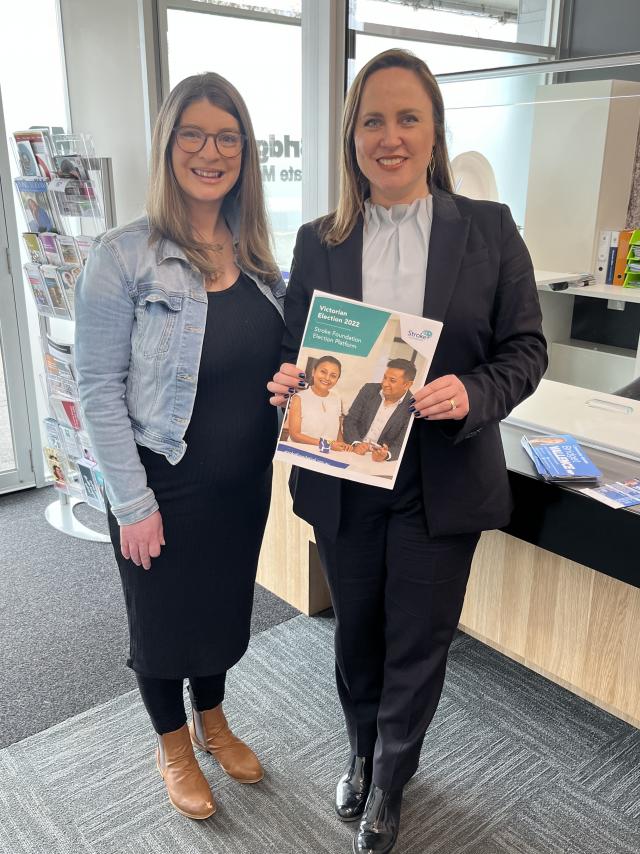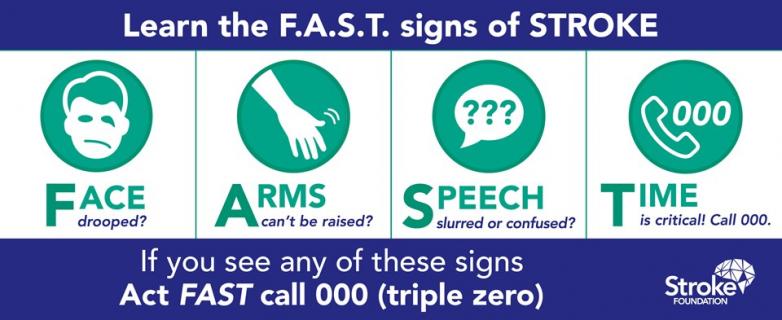
By Mikayla van Loon
When Mount Evelyn resident Nicole Gallacher suffered a stroke in early 2019 during her 22nd week of pregnancy, her dad calling an ambulance for her saved her life.
“I was really lucky that I called my dad. I just felt off. I knew I needed help. I knew something wasn’t right but I didn’t know what exactly was wrong,” she said.
“Then I started to slur my words on the phone. So he got mum to call an ambulance straight away. If he wasn’t able to instruct mum to call an ambulance to get me help so quickly, I wouldn’t be here today.”
Now during the Stroke Foundation’s action week, Ms Gallacher has taken it upon herself to meet with Evelyn MP Bridget Vallence in the hope of gaining more funding for much needed stroke awareness should she be re-elected in the November State election.
“I actually discussed that [story] with Bridget and we were saying it would be perfectly reasonable to go ‘it’s OK, go and have a lie down, and I’ll come and check on you. I’ll be there as soon as I can.’ You might not call an ambulance straight away.
“So part of the funding, [Stroke Foundation] wants $10 million over 10 years, to advertise the FAST campaign for face, speech, time and I think that awareness is so important because if dad hadn’t called that ambulance it would be a totally different story.”
Stroke Foundation CEO Sharon McGowen said this coming election the organisation will be asking for two funding commitments to raise awareness about stroke, the second being about the transition from hospital to rehabilitation.
“We know that over 80 per cent of strokes will show one of the three signs. So that’s a facial droop, a slurring of the speech and an inability to lift both arms [but] we know that 39 per cent of Victorians can’t recognise stroke at all,” she said.
“The second one is our stroke navigator program. We know that people find the health system incredibly challenging to navigate once they’ve been discharged from hospital [and] 26 per cent of Victorians leave hospitals without any discharge plan at all.”
Ms McGowen said over the last 10 years the Stroke Foundation has not received any direct funding from the Victorian government and has been reliant on donations from families.
“We know where we’ve done these campaigns and been funded by other state governments to run these campaigns, we can really lift awareness of stroke,” she said.
“Stroke is a time critical medical emergency, minutes count, every minute that is delayed results in more extensive brain damage, a longer period of recovery, and we can avoid that by educating the public on the first signs of stroke.”
At every election, Ms McGowen said the Stroke Foundation has contacted every candidate on all sides of politics but this year, hearing the experiences of individuals and families she hopes governments will make “monumental change”.
“What people need to hear is the human impact of stroke. Stroke doesn’t just happen to a single person, it happens to an entire family and stroke can happen to anyone at any age.
“So sitting in front of somebody that’s actually had that personal experience who can walk you through what it was like to be discharged from hospital and feel like you’d fallen into a black hole, that’s what will get to the ear and hopefully pull on the heartstrings of our candidates.”
Ms McGowen said about 7000 new strokes will happen in Victoria this year and worryingly, the demographic is shifting to people under the age of 54.
As someone who was quite young when she experienced stroke, Ms Gallacher said everyone’s version of stroke is different and that’s why sharing her story with Ms Vallence was so important.
“She was so kind and very attentive, wanting to listen to my whole story. She gave me lots of her time, which I know is really valuable.
“I’m certainly not an ambassador by any means, I’m just someone who has had a stroke and wants to raise as much awareness as I can and do whatever I can to help.”
Ms Gallacher said from her meeting on Wednesday 28 September, she knows there won’t be any guarantees but trust’s in Ms Vallence’s promise to discuss the funding further with the shadow health minister.
Since being rushed to the Austin Hospital for emergency surgery, being in a coma for two weeks and the death of her unborn child, Ms Gallacher has learnt to walk again, albeit, sometimes assisted and has found a positivity for life.
She is also 28 weeks pregnant again, ready to hopefully welcome her and her husband Dave’s first child in December.
“I want people to know that stroke doesn’t completely stop your wife. Sure, there might be some things that you adapt or some things change but you can still have a really great quality of life.”








